| Article ID | Journal | Published Year | Pages | File Type |
|---|---|---|---|---|
| 4755388 | Trends in Biotechnology | 2017 | 12 Pages |
Abstract
Plant-mediated RNA interference (RNAi) shows great potential in crop protection. It relies on plants stably expressing double-stranded RNAs (dsRNAs) that target essential genes in pest insects. Practical application of this strategy is challenging because producing sufficient amounts of stable dsRNA in plants has proven to be difficult to achieve with conventional transgenesis. In addition, many insects do not respond to exogenously applied dsRNAs, either degrading them or failing to import them into the cytoplasm. We summarize recent progress in RNAi-mediated insect pest control and discuss factors determining its efficacy. Expressing dsRNA in chloroplasts overcomes many of the difficulties previously encountered. We also highlight remaining challenges and discuss the environmental and biosafety issues involved in the use of this technology in agriculture.
Related Topics
Physical Sciences and Engineering
Chemical Engineering
Bioengineering
Authors
Jiang Zhang, Sher Afzal Khan, David G. Heckel, Ralph Bock,
